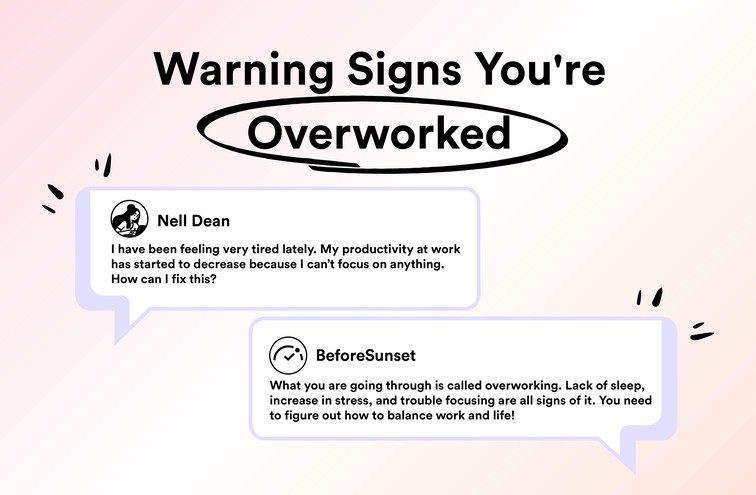It is the greatest feeling to work hard towards your goals and achieve success. The question is what is the line between working hard and overworking? Employees often push themselves to their limits in order to achieve their goals. What starts as a path to success can turn into burnout.APA, 71% of employees feel stressed or tense during the workday, they are disregarding their mental health for work. It begs the question how can overworking be fixed?
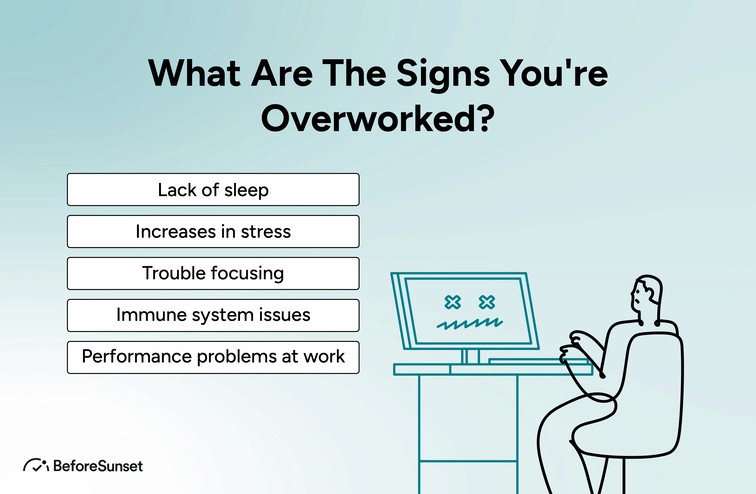
What Are The Signs You're Overworked?
Some employees are unable to recognize the signs of overworking. They are so wrapped up in their work that oftentimes they overlook the symptoms. Being constantly tired, stressed, and having health problems should not be normalized. So here is a list of symptoms so that you know when to stop pushing yourself to your limits.
Lack of sleep
Overworking can lead to symptoms such as lack of sleep and it does so in different ways. Employees can waive sleep in order to continue working. It results in a tired mind and body carrying on with working. Even If they don't pull an all-nighter, their sleep schedule is often messed up. Lack of sleep results in many mistakes being made in their work.
Increases in stress
Stress is the enemy of the body and mind; you could be overworking to not deal with stress in the future, but in most cases, it has the opposite effect. Constantly working and not taking enough breaks are known to cause stress. Unfortunately, it is more common than you think, 822,000 workers are suffering from work-related stress in Great Britain.
Trouble focusing
When you overwork, you suffer from symptoms such as difficulty focusing and forgetting details. Overworking creates a vicious cycle, many employees work too much for too long that which causes them to not be able to work at all due to not being able to focus. This results in the tasks piling up and causes more stress on the mind.
Immune system issues
Did you know that overworking can cause your immune system to overwork as well? It is a known fact that when the immune system doesn't work it is an open invitation to diseases. When your immune system works too much that can cause autoimmune disease. Overworking does not only cause burnout, but it can do irreversible harm to your body as well.
Performance problems at work
The best way to do your job is by using 4d's: do, defer, delegate, and delete but when you try to do everything all at once, it will only result in burnout. This negative feeling can affect productivity and morale. Employees often have performance problems at work because they overwork themselves.
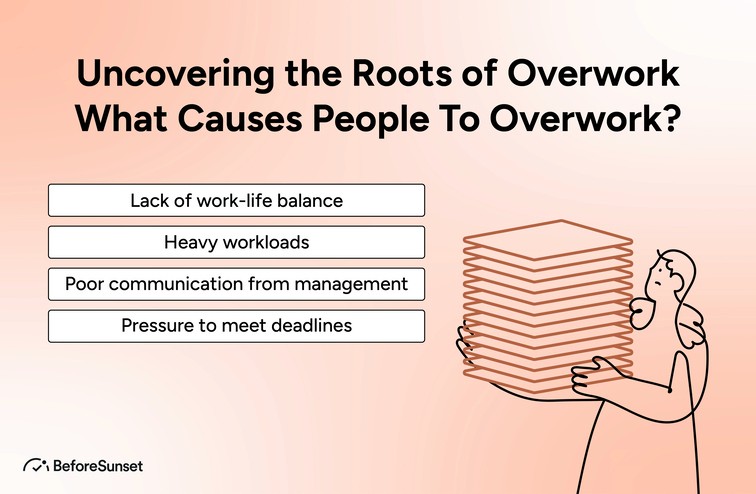
Uncovering the Roots of Overwork: What Causes People To Overwork?
Even If you are working your dream job it is still possible to feel overworked. When you're overworked, it's difficult to have a passion for your job. There are multiple reasons a person can feel that way, from not having a work-life balance to fear of missing deadlines.
Lack of work-life balance
Working is important, it can bring meaning to your life, but it shouldn't be the only thing you do with your life. That is why to avoid overworking you should try to balance your work and life. Spending time with friends and family is important for reducing stress and improving productivity because socializing is as important as working. Also during this time, you should avoid checking email or social media.
Heavy workloads and poor communication from management
When employees are overloaded with work, they experience more stress. Sharing information about company goals, other team members' work and the status of various initiatives helps employees prioritize their workload and stay focused on their tasks.
Providing team members with the context they need to succeed is key to preventing overwork. A workplace that prioritizes its employees should help them avoid overworking. Therefore they won't suffer from the consequences of overwork.
Pressure to meet deadlines
The top reasons employees feel overworked are employer expectations and meeting deadlines. Many employees disregard their health to finish their work at hard-to-meet deadlines. If you are expected to do so much in little time, it's important to talk to your manager about it. Bringing up overwork during meetings or requesting a 1:1 meeting can help your manager understand your situation.
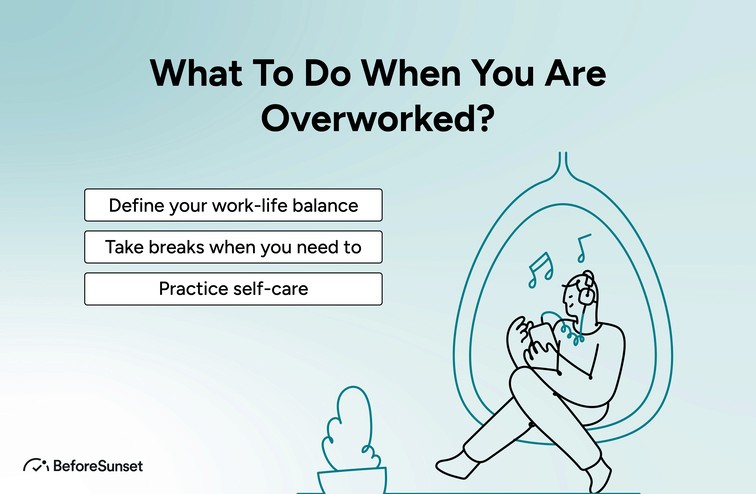
What To Do When You Are Overworked?
It is not only possible but necessary to avoid overworking. Other than making your work quality drop it causes mental and physical health problems. You should be valued as an employee not overworked until you burn out. Here are a few suggestions that can help you feel motivated and productive at work. So, you can once again find pleasure and fulfillment doing your job. A healthy work-life balance is important when it comes to job burnout.
Define your work-life balance
You are so much more than the work you do; you are a person so you should treat yourself as such. Limiting your work hours to improves your overall productivity and stress levels. Make time for socializing and hobbies even if that means meeting in person or calling and texting friends regularly. Remember not to check your phone while hanging out with friends because it can still feel like working
Taking regular vacations was also found to be beneficial for work-life balance. It helps you relax and return to your job better than ever.
Take breaks when you need to
Taking time for yourself and enjoying the small things in life will help you manage stress better. Therefore, to have a better working experience you must take breaks. You can use this time to stretch and drink some coffee. You can also have a chat with your co-workers which will definitely improve your morale.
To know how much you work and when to take a break you can track your time. BeforeSunset has the simplest time-tracking option that will help you with your overworking problem. Try a healthy balance between simple tasks and family time.
Be aware of the signs of being an overworked employee
Overworking can cause several negative effects, including difficulty relaxing, stress, and gaining weight. They also include being unable to complete a to-do list and seeing your health deteriorate. If you catch these common signs early, it is possible to reverse these effects and take a break. When your body and mind relax, you will find working so much easier.
When you know the signs of overworking you can work smarter, not harder by taking short breaks and blocking out time for non-urgent e-mails. Prioritize and schedule your tasks in a way that makes the most sense for you. It is important to delegate tasks to others in order to reduce stress.
When tasks are delegated, it gives the individual more control over their work and reduces stress. Think of your home as a sanctuary where you can escape the pressures of work so don't bring work to your home. You can have extra hours for personal time therefore symptoms of overwork such as chronic stress and emotional exhaustion can be minimized.
Practice self-care
Don't forget to take care of yourself, this includes taking breaks, healthy eating, and being mindful of your mental health. Taking regular breaks can help recharge tired muscles, clear your head, and improve your mental focus. Avoid overworking yourself by making a schedule and sticking to it. Set healthy boundaries for your work.
To prevent burnout, take care of your body, mind, and soul by eating better, moving better, and sleeping better. Invest in your "me time" to recharge and relax.
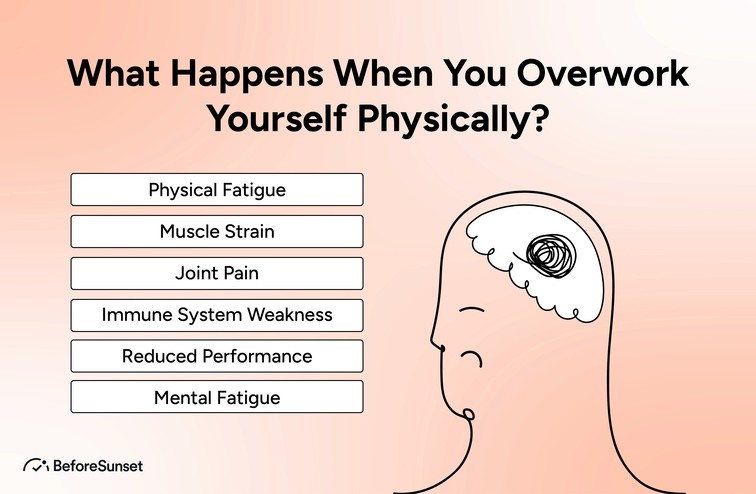
What Happens When You Overwork Yourself Physically?
Physical Fatigue: Excessive physical exertion can cause considerable exhaustion, making it difficult to carry out even straightforward tasks. Your entire motivation and energy levels may be impacted by this.
Muscle Strain: Overexerting one's body physically without getting enough rest can cause muscular strain, which can cause pain, stiffness, or even more serious injuries including muscle rips or sprains.
Joint Pain: Excessive joint tension that is repeatedly applied to a joint can cause joint pain, inflammation, and diseases like tendinitis or bursitis.
Immune System Weakness: Consistent physical exhaustion can make your immune system less effective, leaving you more prone to infections and diseases.
Reduced Performance: In contrast to popular assumption, overworking oneself physically can actually reduce your overall performance by impeding your body's capacity for recovery and adaptation.
Mental Fatigue: Physical tiredness can also cause mental depletion, which affects your capacity for decision-making, problem-solving, and focus.
Injuries: Injury risk is increased when you push your body too far without adequate rest and recuperation, which can lead to fractures, sprains, and other acute injuries.
Heat Exhaustion and Dehydration: Working too hard in hot, humid weather without adequate water can result in heat-related disorders including heat exhaustion and heatstroke.
Sleep Disturbances: Physical weariness can cause sleep disturbances, such as insomnia or poor sleep quality, which can worsen existing physical and mental health conditions.
Chronic Health Problems: Overworking your body repeatedly over a protracted period of time can lead to the emergence of chronic health concerns like cardiovascular difficulties, high blood pressure, and metabolic disorders.
Effects on Mental Health: Being overworked can have a negative impact on your mental health by raising your risk of stress, anxiety, and even depression.
Is It OK To Tell Your Boss You're Overwhelmed?
It is completely OK to inform your manager that you are experiencing work-related stress. A good work environment is fundamentally characterized by open and honest communication between employees and their managers. Dealing with the problem might be crucial for both you and your company because being overwhelmed can affect both your well-being and work performance.
Timing is a crucial component of this communication. It's crucial to pick the right moment and location for this chat. Avoid talking about your overwhelm while things are hectic or under strain. Request a meeting or private conversation instead, when your employer will be present and able to concentrate on your issues.
It's important to be explicit about the reasons why you're feeling overwhelmed when you do speak with your manager. Describe the causes of your stress, such as an overwhelming task, a pressing deadline, or a conflict of obligations. Giving specifics might aid your manager in identifying the underlying reasons of the problem and enhancing assistance.
Consider including suggested solutions or management techniques to help you better handle your task. This proactive stance might show that you are dedicated to reaching an agreement and can improve the discourse. You may encourage greater collaboration by demonstrating your willingness to cooperate in order to solve the issue.
You may also enquire about the required assistance throughout the chat. Your supervisor may have access to resources that can lessen your burden or help you develop the skills you need to handle it more successfully, whether it be more resources, training, or aid from coworkers.
You must conduct yourself professionally during this chat. Never accuse or criticize anybody since this might trigger defense mechanisms and pointless confrontation. Concentrate on coming up with solutions and preserving a good working connection with your boss.
It's also essential to actively listen to your boss's comments and recommendations. They could have information or options you hadn't thought of, which might help you come up with a strategy for dealing with your overload that is more successful.
Finally, don't forget to follow up after the initial discussion. Ensuring the problem is handled and remedied may be achieved by giving updates on your progress and talking about whether the chosen solutions are successful.
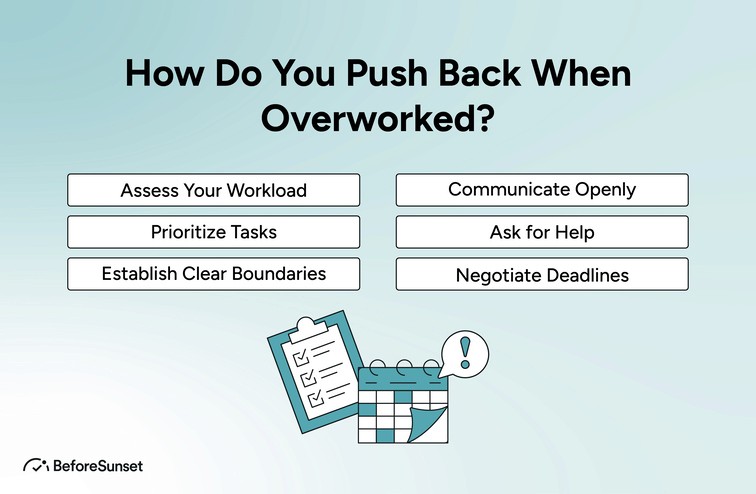
How Do You Push Back When Overworked?
Assess Your Workload: Start by assessing your present obligations and workload. To get a clear picture of the work that has to be done, make a list of the tasks, projects, and due dates.
Prioritize Tasks: Determine which tasks are the most important and time-sensitive before giving them priority. Concentrate your attention on these high-priority jobs and, if feasible, think about lowering their importance or assigning them to others.
Establish Clear Boundaries: Set limits for your availability and working hours. Share these restrictions with your boss and coworkers. Tell them, for instance, when you won't be accessible for work-related duties outside of usual business hours.
Communicate Openly: Openly communicate with your manager about your workload and any worries you have about being overworked. Be explicit about the activities or circumstances that are stressing you out the most and describe how this is affecting your performance and general well-being.
Ask for Help: If you're feeling overwhelmed, ask for assistance or more resources. Your boss might be able to reassign responsibilities, delegate them to others, or offer support in other ways, including by hiring temporary help or conducting training.
Negotiate Deadlines: If you have too many pressing deadlines, talk to your supervisor about if it might be possible to postpone some of them. Make sure to offer a compelling justification for the delay and suggest a workable new date.
Delegate Where Possible: Where it's possible, delegate: If you have coworkers who can assist with particular chores, think about giving them duties. In addition to reducing your workload, delegation encourages teamwork.
Suggest Process Improvements: Identify any ineffective procedures or workflows that could be causing your overwork and make suggestions for improvements. Make suggestions for adjustments or enhancements that might simplify processes and lighten the effort.
Say "No" When It's Necessary: Develop the ability to decline new duties or projects when you're already stretched too thin. Politely refuse any more obligations that may put you at extra risk.
Seek Support: If you still feel overworked despite your efforts to push back, get in touch with HR or your company's employee help program. They are able to offer help, resources, and direction.
Take Breaks and Vacations: Give breaks and downtime for recharging top priority. Utilizing your vacation time and taking frequent breaks during the workday can aid in stress management and help you avoid burnout.
Document Your Workload: Keep a log of the tasks, projects, and time allocated to each. This paperwork offers concrete proof of your condition, which can be helpful when addressing your workload with your manager or HR.
Consider Self-Care: Include self-care activities in your everyday routine. Exercise, meditation, a healthy diet, and enough sleep can all help you manage stress and perform better at work.
Am I Lazy Or Overworked?
It might be difficult to distinguish between being overworked and being lazy. Your own circumstances and habits will determine this. It could be a sign of laziness if you often put off doing things, lack motivation, and procrastinate.
However, you may be overworked if you frequently feel overwhelmed by a large workload, suffer from excessive levels of stress, and get mentally and physically weary. It's important to be honest with yourself and determine whether other influences, such as an overwhelming workload, are influencing your sentiments.
You may better comprehend and deal with whether you are lazy or overworked by attempting to strike a balance between work and personal life and addressing the underlying reasons for your problem.
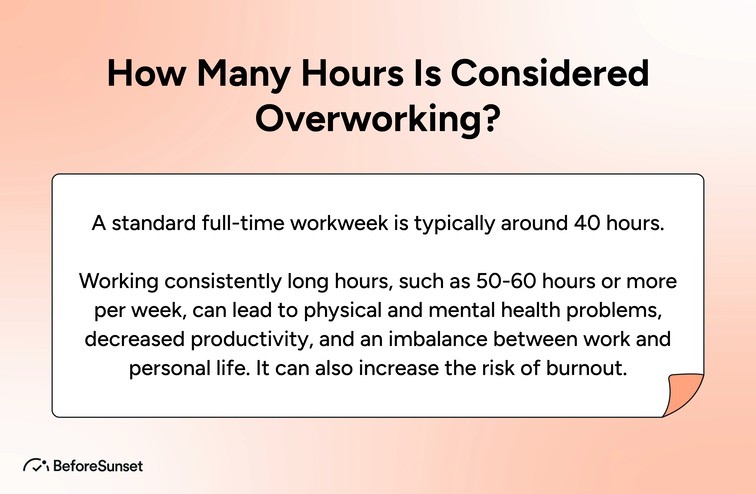
How Many Hours Is Considered Overworking?
Based on a variety of variables, such as an individual's tolerance level, regional labor regulations, and job requirements, the number of hours that constitute overworking can vary significantly. However, going beyond a typical 40-hour workweek for a full-time employee serves as a point of comparison.
Overworking is sometimes defined as consistently putting in 50, 60, or more hours a week, or much more than this benchmark. However, the definition of overwork is extremely subjective and can vary depending on the nature of the job, one's health, and whether or not there is a work-life balance.
Importantly, working too much can result in burnout, health problems, and decreased productivity; therefore, it's essential to strike a balance that fosters well-being and long-term job success.
The Difference Between Overwork and Burnout
In terms of stress at work, overwork and burnout are related but different ideas. Overwork is often defined as a condition in which one is subjected to unreasonable expectations at work, which is frequently characterized by long hours and a large workload. It emphasizes the volume and quality of effort.
On the other hand, burnout is a more severe and pervasive syndrome brought on by ongoing working stress. It includes feelings of emotional tiredness, a sense of separation from one's job, and a diminished sense of accomplishment.
Burnout includes both the physical and psychological toll that too much labor causes. It frequently necessitates a longer recovery period and can have long-term effects on both physical and mental health. Burnout is a complicated, multi-dimensional illness that goes beyond merely working long hours, although overwork can contribute to it.
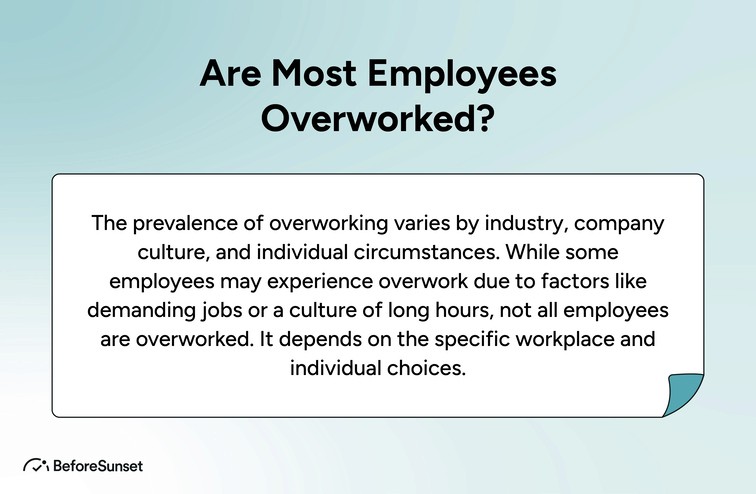
Are Most Employees Overworked?
Depending on a number of variables, such as the sector, job functions, and particular workplaces, the degree of employee overwork can vary dramatically. Due to the nature of the work and the requirement for continual availability, extended working hours and high levels of stress are more typical in particular industries, such as healthcare, finance, or the technology industry.
Additionally, some businesses place a higher value on production than on work-life balance, which might cause people to work too much. Not all employees are overworked, it's essential to remember, and many businesses are starting to realize how crucial it is to encourage work-life balance, employee wellbeing, and productivity through initiatives like flexible scheduling and mental health assistance.
Overwork prevalence varies considerably, and it depends on both personal preferences and company culture and rules.
Do Overworked Employees Quit?
Yes, employees who are overworked are more likely to leave their positions. Overworking may cause stress, physical and mental tiredness, a poor work-life balance, and increased tension, all of which have a negative impact on overall well-being and job satisfaction.
Employees may begin looking for different job possibilities that provide a healthier work environment and better work-life balance when they constantly feel overworked and unappreciated as a result of an excessive workload and stress.
High turnover rates may be a major worry for businesses that don't address concerns with overwork since they can lead to higher expenses for hiring and training new employees, worse team morale, and perhaps adverse effects on productivity and performance.
To retain exceptional people and preserve a positive workplace culture, employers must identify and solve overwork.
Stop Overworking Use BeforeSunset AI
BeforeSunset AI prevents overwork and promotes a healthier work-life balance. Using the time-blocking feature enables you to allocate specific time slots for tasks and meetings. This can help you manage your time more efficiently and avoid overloading your schedule with back-to-back tasks.

